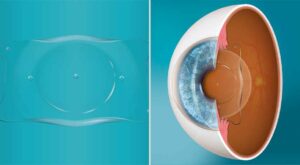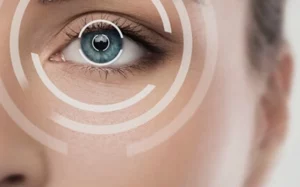Keratoconus is a progressive eye condition that can cause distorted vision, nearsightedness, and astigmatism. While glasses and regular contact lenses can help manage these symptoms, some people may not be able to achieve satisfactory vision with these methods. In recent years, implantable contact lens (ICL) surgery has emerged as a potential treatment option for individuals with keratoconus. This blog will explore the benefits, limitations, and potential risks of ICLs for keratoconus, as well as factors to consider when deciding if this procedure is right for you.
Contents
What Is Keratoconus?
 Keratoconus is an eye condition that affects the cornea. Normally, the cornea is a clear, dome-shaped surface that covers the front of the eye. However, in keratoconus, the cornea becomes thin and gradually bulges outward into a cone-like shape. This causes vision problems, such as blurry or distorted vision, sensitivity to light, and difficulty seeing at night.
Keratoconus is an eye condition that affects the cornea. Normally, the cornea is a clear, dome-shaped surface that covers the front of the eye. However, in keratoconus, the cornea becomes thin and gradually bulges outward into a cone-like shape. This causes vision problems, such as blurry or distorted vision, sensitivity to light, and difficulty seeing at night.
Keratoconus usually develops in the teenage years or early adulthood, and it may progress slowly over 10 years. In some cases, the condition can be managed with corrective lenses or surgery. However, in severe cases, a corneal transplant may be necessary to restore vision. The exact cause of keratoconus is not known, but it is thought to involve a combination of genetic and environmental factors.
Can Keratoconus Be Cured By Implantable Contact Lens?
Implantable contact lens surgery, also known as phakic intraocular lens surgery, is sometimes used to correct vision in people with keratoconus. These lenses are surgically implanted into the eye, either in front of or behind the iris. This can correct vision by modifying the way that light passes through the eye.
However, implantable contact lenses are not a cure for keratoconus. They can help to improve vision in some people, but they do not address the underlying cause of the condition, which is the thinning and bulging of the cornea. In some cases, implantable contact lens surgery may not be a suitable option for people with severe keratoconus or other eye conditions.
How Can ICL Treat Keratoconus?
 Implantable contact lenses, also known as phakic intraocular lenses, can only help to improve vision in some people with this condition. It cannot treat the irregular shape of the cornea.
Implantable contact lenses, also known as phakic intraocular lenses, can only help to improve vision in some people with this condition. It cannot treat the irregular shape of the cornea.
The lenses are surgically implanted into the eye, either in front of or behind the iris, and can correct vision by modifying the way that light passes through the eye. In people with keratoconus, the cornea becomes thin and bulges outwards, causing blurry and distorted vision. Implantable contact lenses can help to compensate for the irregular shape of the cornea and provide clearer vision. This is the procedure that is usually done in ICL.
Why Choose ICL For Keratoconus?
Implantable contact lenses may be a good option for some people with keratoconus for several reasons:
- Improved Vision Quality
In people with keratoconus, the cornea becomes thin and bulges outwards, causing blurry and distorted vision. Implantable contact lenses can help to compensate for the irregular shape of the cornea and provide clearer, sharper vision. This can improve quality of life and make it easier to perform daily activities such as reading, driving, and working.
- Minimally Invasive
Implantable contact lens surgery is a minimally invasive procedure that is typically performed on an outpatient basis. It involves making a small incision in the eye and inserting the lens through this incision. The procedure usually takes less than 30 minutes to complete and is generally well-tolerated by patients.
- Reversibility
Unlike some other surgical treatments for keratoconus, such as corneal transplant surgery, implantable contact lenses are reversible. If a patient experiences any problems or complications after the surgery, the lenses can be easily removed or replaced. This can provide peace of mind for patients who may be hesitant to undergo a more permanent surgical procedure.
- Long-lasting
Implantable contact lenses are designed to be a long-term solution for vision correction. They are made from biocompatible materials that are well-tolerated by the eye and can provide clear vision for many years. Some studies have reported that implantable contact lenses can last up to 10 years or more.
Is There Any Limitation Of ICL?
 Yes, like any medical procedure, implantable contact lenses (ICLs) have some limitations and potential risks. Here are some factors to consider:
Yes, like any medical procedure, implantable contact lenses (ICLs) have some limitations and potential risks. Here are some factors to consider:
- Suitability
Not everyone with keratoconus is a suitable candidate for implantable contact lenses. The procedure may not be recommended if you have certain eye conditions or if your cornea is too thin or irregular.
- Surgical Risks
Like any surgery, there are risks associated with implantable contact lens surgery. These can include infection, bleeding, inflammation, and damage to the surrounding eye structures.
- Vision Quality
Although implantable contact lenses can improve vision quality in many people with keratoconus, they may not be able to correct all types of vision problems. In some cases, you may still need to wear glasses or contact lenses after the surgery.
- Cost
Implantable contact lenses are typically more expensive than glasses or regular contact lenses. The cost may not be covered by insurance, and you may need to pay out of pocket for the procedure.
- Post-surgical Care
After the procedure, you will need to follow specific instructions for post-surgical care. This may include using eye drops and avoiding certain activities, such as swimming or heavy lifting.
What Is The Cost Of ICL For Keratoconus?
 The cost of implantable contact lenses (ICLs) for keratoconus can vary depending on several factors. Such as the type of ICL used, the location where the surgery is performed, and the individual needs of the patient. However, the cost of ICL surgery can generally be higher than other treatments for keratoconus. Such as glasses or regular contact lenses.
The cost of implantable contact lenses (ICLs) for keratoconus can vary depending on several factors. Such as the type of ICL used, the location where the surgery is performed, and the individual needs of the patient. However, the cost of ICL surgery can generally be higher than other treatments for keratoconus. Such as glasses or regular contact lenses.
In India, the cost of ICL may range somewhere between 80K- 1 Lakh INR per eye. This cost can be higher if additional procedures, such as a corneal transplant or other surgical intervention, are needed. It’s important to keep in mind that insurance coverage for ICL surgery can vary. Not all insurance plans cover the procedure.
It’s important to discuss the cost of ICL surgery with your eye doctor and to explore any insurance coverage options that may be available. Your doctor may also be able to provide information about financing options or payment plans that can help make the procedure more affordable.
Conclusion
Implantable contact lens surgery (ICL) can be a viable option for individuals with keratoconus who are not able to achieve satisfactory vision with glasses or regular contact lenses. ICL surgery involves implanting a special lens into the eye to correct vision. While ICLs can offer many benefits, there are also risks and limitations to consider. If you have keratoconus and are interested in learning more about ICLs, it’s important to consult with an eye doctor who specializes in the condition. Don’t hesitate to seek help to determine if ICLs are right for you.
Lasik surgery is a safe 10-minute procedure to help you get rid of glasses. EyeMantra offers the most advanced LASIK options including PRK, Femto LASIK, SMILE surgery, Standard LASIK, ICL, and Contoura vision. If you have any questions on LASIK surgery in Delhi, Lasik surgery cost, and Lasik procedure, call us at 9711116605 or email at [email protected].



Real good information can be found on website.Blog monry